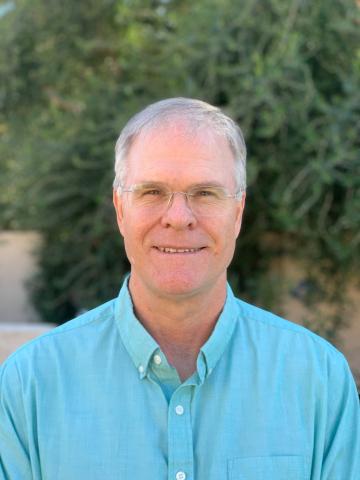
Outstanding Faculty Mentors

Kelin Whipple
School of Earth and Space Exploration, The College of Liberal Arts and Sciences
Kelin Whipple has been a professor in the School of Earth and Space Exploration at ASU since 2006. He earned his Ph.D. in Geological Sciences at the University of Washington in 1994; enjoyed a one-year postdoc at the University of Minnesota’s St. Anthony Falls Laboratory, and was on the faculty in the Department of Earth, Atmospheric and Planetary Science at MIT from 1995-2006. He is a geomorphologist interested in the interactions among climate, topography, and tectonics. His work focuses on developing the capacity to interpret the history of tectonic activity and climate change that is recorded in landforms and associated sedimentary records. Active projects and interests span a range from small-scale modeling and investigation of the physics of bedrock channel erosion, to reach-scale modeling of the dynamics of bedrock channel evolution, to neotectonic studies of active deformation using geomorphic tools, and to quantitative investigation of linkages between tectonics, climate, and surface processes at mountain range scale. These work efforts integrate field, experimental, remote sensing, and numerical approaches.
My mentoring philosophy is essentially that my job is to enable and facilitate my mentee’s future success; the priority and focus is their research and their careers, not mine. My career benefits, arguably even optimally so, when I focus my efforts on their success. Moreover, when I accept a graduate student or hire a postdoctoral researcher I see this as a life-long commitment to mentoring and advocating as their careers advance and they face various decision points and challenges – just as my former advisors are there for me.
I learned early that every mentor-mentee relationship is unique. Different approaches work better for different individuals, so I do not have a set style, but try to identify, and adapt to, the style that works best in each case. I do not micro-manage, but I am also not a “hands off” advisor. I enjoy actively engaging in the research each of my mentees is pursuing. I enjoy as well discussions and debates over the philosophy of science and pedagogy. I have learned a great deal from students and postdocs over the years.
Successful advising I find depends first and foremost on identifying what are each mentee’s goals. Among my Ph.D. students and postdocs all have had a career in active scientific research as a goal; most are now in tenure track faculty positions though a few have opted instead for other research or technical positions. Given this common goal, I always strive to guide my Ph.D. and postdoctoral mentees to work on a fundamentally important and timely problem. I work with mentees to develop and refine the ability to select good problems to pursue. In my estimation the knack of selecting the right questions to ask – more than raw intellect or technical skill – is what sets apart the most influential scientists.
Once a research question is defined (and refined), I strive to engage every mentee in the proposal writing process so they can learn this critical skill. While graduate students usually engage in a supporting role (developing figures, editing), I encourage postdocs to take the lead in writing proposals, often as PI. I like to work 1-on-1 with mentees to refine the skills and approaches that constitute their research efforts. I strive to have all develop multiple skillsets (at least 3 among field work, laboratory work, remote sensing analysis, theory, numerical modeling) as this breadth will serve them well in their own research and in working with their own mentees in future. I work closely with all mentees on developing their skill writing journal articles – the student or postdoc is always in the lead on papers stemming from their research. Each of my mentees is first author on most papers we have written together. Indeed, more than half of my papers cited more than 90 times have a mentee as first author.
Beyond the research enterprise (selecting problems, writing proposals, conducting research, and writing papers) I do my best to prepare mentees for navigating the job market and finding a sustainable and happy work-life balance. I meet with mentees to discuss preparation of application materials, to prepare and refine interview research presentations, and to make sure they know what to expect during interview visits. Finally, in my view it is critical to allow both students and postdocs the time and opportunity to complete projects that are outside the scope of the research they are doing with me. This ranges from completing papers on research started prior to joining my group (papers on which I am not a co-author), writing research proposals to fund their future work, applying for fellowships, and networking.
At times I have had to remind mentees to take care of their physical and emotional well-being; productivity actually increases with a health amount of time off. I make a point of discussing the work-life balance challenges of academic positions. Most of my mentees have faced the challenge of juggling young children and the tenure clock (some starting in graduate school), most in dual-career families, so I’ve learned that these are important discussions to have even for mentees for whom a family seems like a far-off possibility.
No one really trained me how to be a mentor, except by modeling both good and less-good practices. If I learned one key lesson though its simply to listen, to pay attention and respond in as helpful a way as possible. It is also important to reach out proactively if you recognize unspoken signals as well.